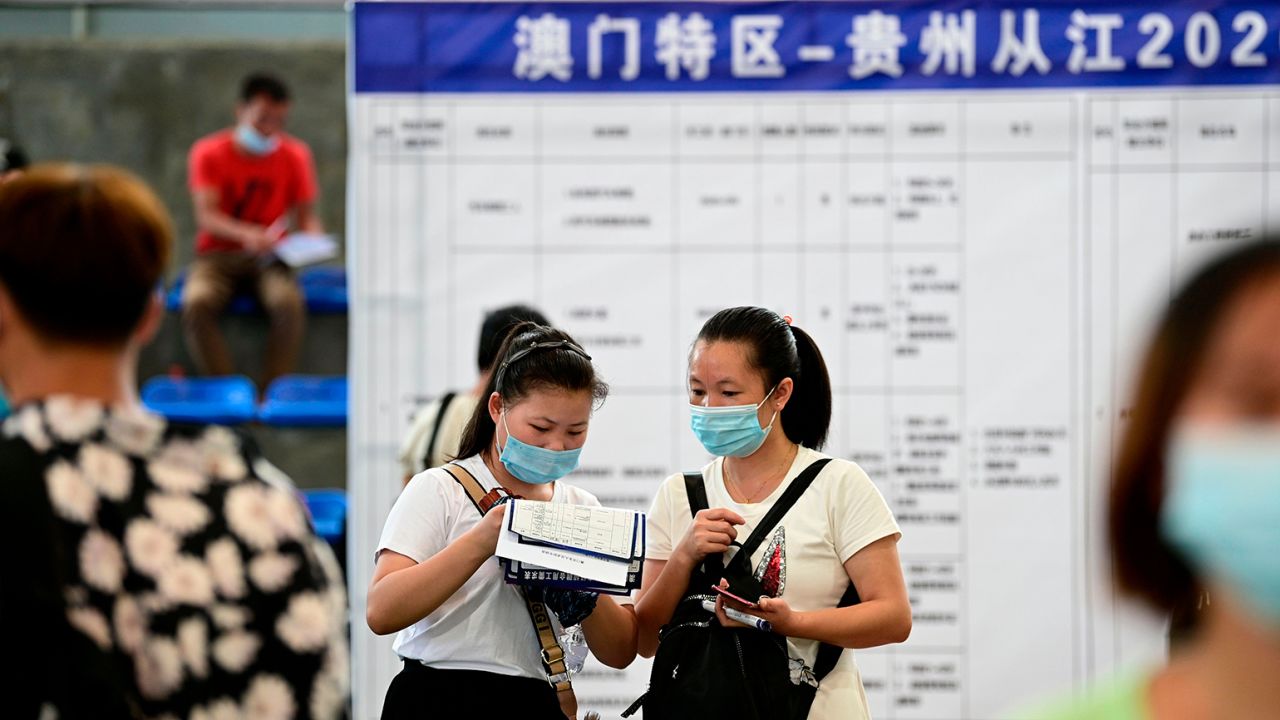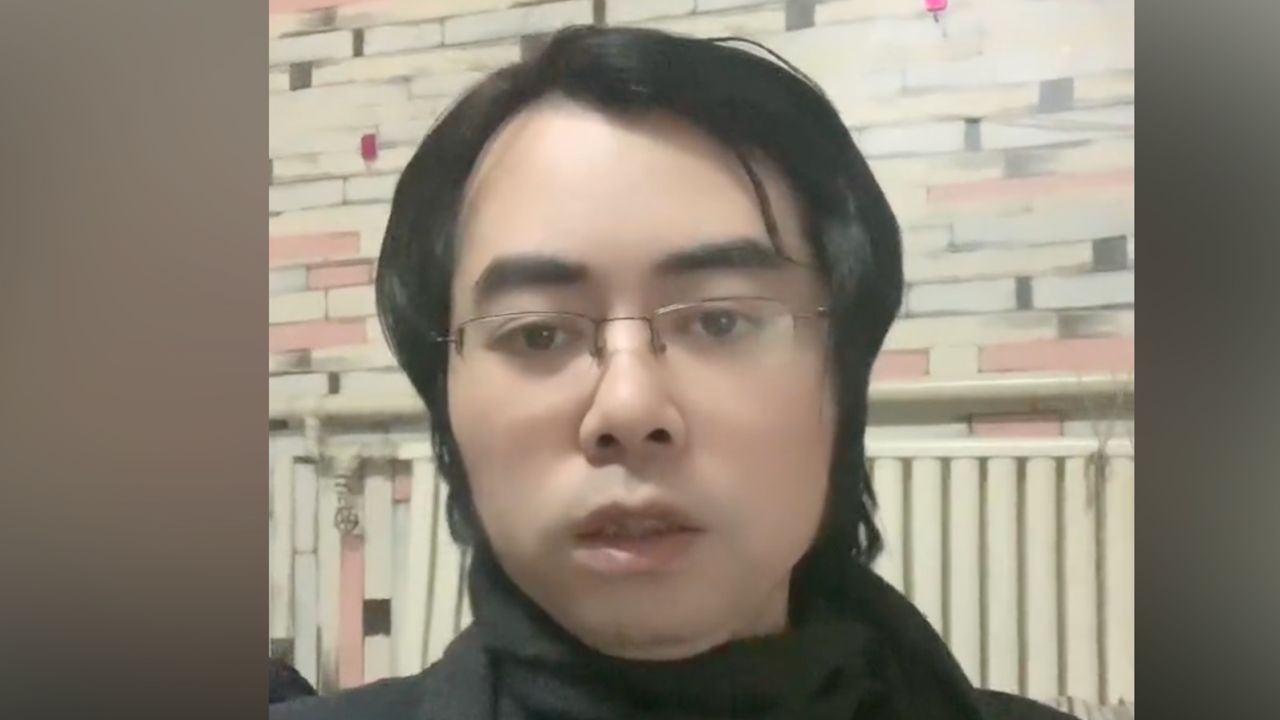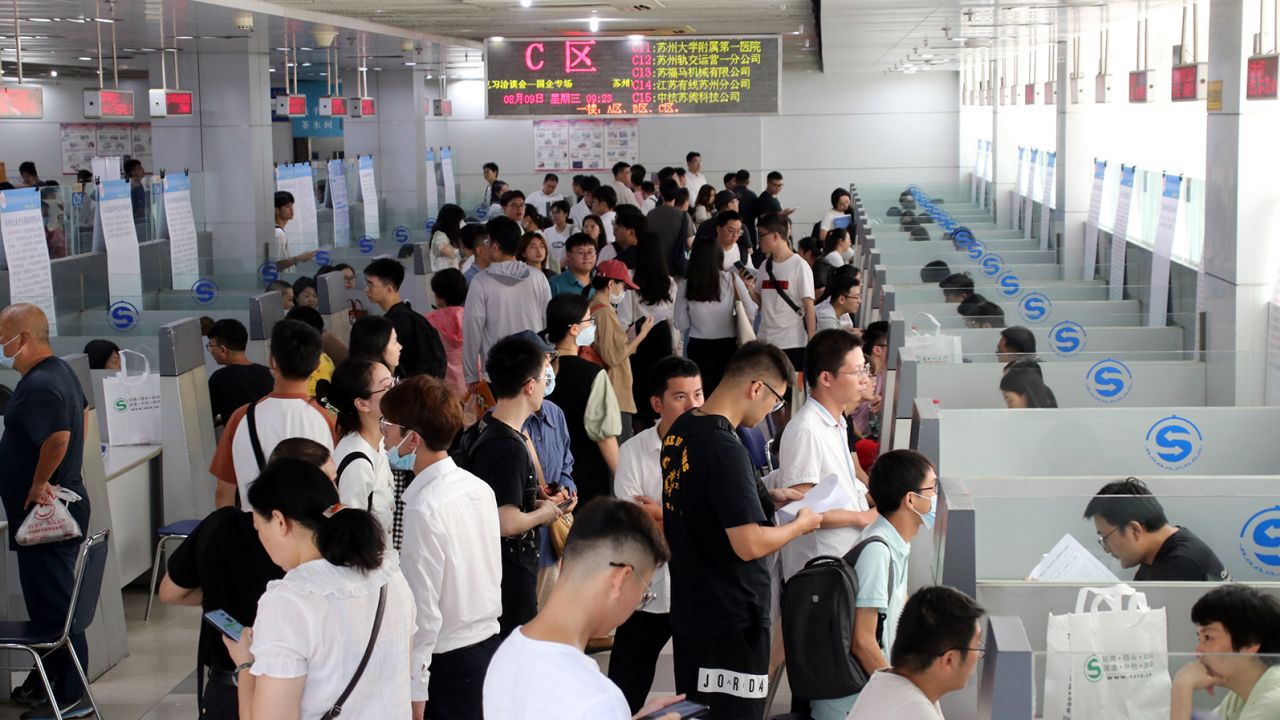When Han lost her job as an interface designer in Beijing in February, she figured her 10 years of experience meant she wouldn’t need to look long for alternative work.
But with the job hunt dragging on, she’s beginning to worry. She’s sent off hundreds of job applications – and been invited to only four interviews.
Out of options in her chosen profession, she has turned to part-time jobs to make ends meet, working as a food delivery driver – where she was “lucky to earn 20 yuan ($2.8)” a day – and as a shopping guide, which she gave up after developing acute appendicitis, she says from standing too long.
“I tried every possible job, but they were either too energy-consuming or paid too little,” she said. “It’s difficult to maintain basic life every day, it seems.”
The root of Han’s problem, she believes, is that she has simply become too old in the eyes of many would-be employers. She is 34 years old.
Han, who CNN is identifying by only her last name due to privacy concerns, is among the many millennial workers in China who fear they have succumbed to the “curse of 35.”
The term was originally coined on social media to describe rumored lay-offs of older workers by major tech companies, but it has since become so widespread it is referenced even by advisers to China’s ruling Communist Party.
Anyone who doubts the curse’s potency need only look at the countless online job listings and recruitment sites that state explicitly that candidates should be no older than that age, which many experts don’t even consider middle-aged.
Or look on social media; in June, a traveler’s complaint that hostels in Beijing commonly turn away customers older than 35 sparked heated debate, as did a recruitment drive by a Taoist temple in June when it said new monks must be “under 35 years old.”
Indeed, even the Chinese government rules out candidates above 35 for many of its civil servant positions – a policy challenged by a lawmaker at last year’s annual gathering of China’s parliament and top political advisory body.

“Invisible age discrimination for 35-year-olds has always existed in the workplace,” lawmaker Jiang Shengnan told the gathering, reported state-run China Youth Daily. “It’s a huge waste of talent to reject candidates for their age.”
Even top academics and officials have acknowledged the issue. In a 2022 report by the state-run paper People’s Daily, a professor at the government-run Central Party School – which educates Chinese Communist Party cadres – referred to the curse as a “common phenomenon in the mass labor market” and blamed it for causing widespread public anxiety.
This year, the state-run news agency Xinhua proposed what it saw as a possible solution – special policies favoring workers above 35, along with financial assistance and regulations against ageism.
For many among China’s hundreds of millions of millennials, solutions can’t come fast enough. With China still struggling to recover from the economic damage of the pandemic and signs its growth is slowing, unemployment has become a pressing concern for many. Nationally, the official jobless rate surged to a near-record high of 6.1% last year, and while the end of lockdown brought some relief, it remains at 5.2%.
Leaders or bust
The issue has been brought to the fore in part by the rise of China’s tech industry and its notorious “996 culture” – working from 9 a.m. to 9 p.m., six days a week.
It’s an uncompromising schedule that’s even harder for older employees with families to attend to, but it’s a common expectation in the country’s highly competitive – and relatively young – tech sector.
Experts also point out that young workers hired straight from school tend to be cheaper, though others suggest the preference is not only about keeping expenditure low.
A 2021 Xinhua report reasoned that employees who hadn’t been promoted to management levels by 35 may be perceived as less successful, thus more susceptible to layoffs.
The Central Party School professor made this point in his report last year, saying: “Generally speaking, most employees with 10 years of experience will become leaders or team managers if their abilities are really good. In other words, the ’35-year-old threshold’ is not about age itself, but a measure of work ability for employers.”
But these limits mean many people find themselves like Han, the Beijing resident: overqualified, educated, experienced, and struggling to keep themselves afloat with gig work.
This is especially true as more and more people pursue masters’ and PhD degrees in the hopes of gaining an edge in the crowded job market – thus ironically delaying their entry into the old job market.

One content creator, Tao Chen, gained nationwide attention in March after posting about his experience online. After graduating from the prestigious Sichuan University with a master’s degree in philosophy, he was laid off from a journalism job, then embarked on a string of failed business projects. At 38 years old, with few other prospects, he became a food delivery driver – eventually giving up that job too because the income wasn’t enough to make ends meet.
“Although I had really good work experience and a master’s degree, I’m really uncompetitive after 35 years old,” Tao Chen said in his Douyin video. More than 98% of his job applications were unanswered, while the rest found he was “unfit” for the role.
“I almost had a mental breakdown,” he said.
New twist on an old story
For many Chinese women, the “curse” builds upon and further compounds the entrenched gender discrimination that has long plagued the workplace.
Female workers in this age range often say they face pressures from employers reluctant to pay maternity leave. They report missing out on promotions because their employer fears they will take a long stint off, or worse – they might not get employed in the first place.
“Seeing this age, many companies aren’t willing to recruit you,” said Han, the Beijing resident. “They prefer the young ones. After all, I might get married and have kids in their eyes. Even though I tell them I do not intend to get married, they wouldn’t believe it.”
When 35-year-old Shenzhen resident Liu returned to her job at a bioengineering firm after a six-month maternity leave, she was expecting to join a new project. Instead, she said, she was abruptly laid off and her position given to a fresh graduate.
Months later, she has yet to find another job. Liu, who requested a pseudonym for privacy reasons, believes it was her maternity leave that prompted her dismissal.
“They are very realistic. When I don’t need you, I replace you with cheaper labor,” she said.
Men can be affected, too. Liu remembers witnessing a male colleague who had just become a father being given what she called inappropriate assignments, like being sent on a business trip immediately after the birth.
She said she had also seen millennial and middle-aged employees being singled out for embarrassment by being asked to raise their hands in meetings if they were over 30 or by not being invited to company parties.
Liu suspects the biggest motivation for employers is simply their bottom line. “Many companies consider cost efficiency,” Liu said. “They think my salary is higher than new graduates, so they’d rather choose the graduates.”
‘I can see through their tricks’
Experts say the best way to guard against both ageism and gender inequality is through legal reform.
Yiran Zhang, assistant professor at Cornell Law School, said that while China’s labor law prohibited discrimination on grounds of ethnicity, gender, and religious belief, it does not do so on the grounds of age.
And even in areas where some protection was offered – such as for mothers taking maternity leave – enforcement of the law is weak, and gender discrimination remains common, she said.
Employees who do successfully sue their employer may only receive low damages, disincentivizing some from pursuing legal action, Zhang added.

“A large amount of age discrimination is intersectionality – discrimination of age, gender, pregnancy, and caregiving duties,” said the assistant professor.
Zhang and other experts noted there had been attempts in the past to legislate against age discrimination, with some politicians seeing it as a priority to lift the falling birth rate, but so far these have failed to pass in parliament.
Some small progress came earlier this year, when several provinces and regions relaxed age restrictions for civil servant jobs, raising the limit from 35 to 40, state media reported.
Meanwhile, Liu – the former project manager in Shenzhen – now hopes to make a living as a content creator so she doesn’t have to return to a traditional workplace riddled with ageism and discrimination.
“I have been in both big companies and small companies, I can see through their tricks,” she said. “I just want to run away from there.”
"some" - Google News
August 27, 2023 at 06:42AM
https://ift.tt/NFkyLnd
The 'curse of 35': In China, millennials are already too old for some employers - CNN
"some" - Google News
https://ift.tt/QCXk4MJ
Shoes Man Tutorial
Pos News Update
Meme Update
Korean Entertainment News
Japan News Update
Bagikan Berita Ini















0 Response to "The 'curse of 35': In China, millennials are already too old for some employers - CNN"
Post a Comment